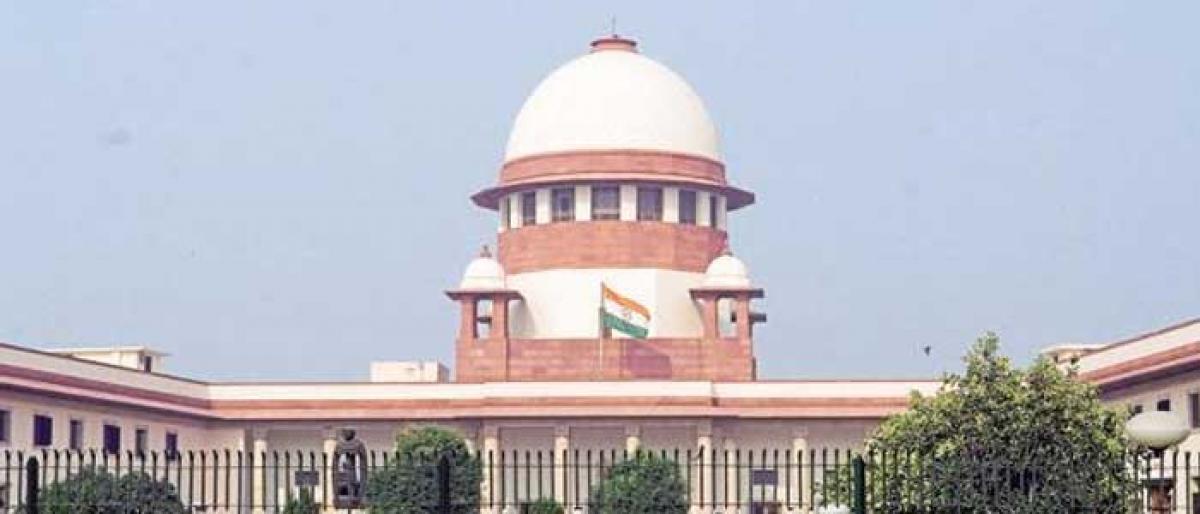Live
- South African President orders immediate closure of tuck shops linked to food poisoning cases
- Study explains mechanisms behind food poisoning, gut infections
- UN warns armed violence deepens humanitarian crisis in Sudan
- Maha Vikas Aghadi will win over 160 seats, form government in Maharashtra, says Shivakumar
- 6 Factors to Consider While Choosing the Right IVF Clinic in Hyderabad
- PM Modi emplanes for three-nation visit to Nigeria, Brazil, Guyana
- Chandrababu stresses on deregulation in telecom sector at Hindustan Times conference
- MP govt to promote 'Gita Jayanti' like other festivals
- Sidhant Gupta Revolutionises India’s Dairy Sector with Cutting-Edge Technology
- National Press Day 2024: Honouring Journalism in the Digital Era
Just In

In a majority 3:2 judgment, a five-judge Bench of the Supreme Court on Tuesday set aside \'talaq-e-biddat\' or instant and irrevocable \'talaq\' as a \"manifestly arbitrary\" practice bringing curtains down on a long-debated interpretation in Islam. The practice in itself was not protected by Article 25 (freedom of religion) of the Constitution.
In a majority 3:2 judgment, a five-judge Bench of the Supreme Court on Tuesday set aside 'talaq-e-biddat' or instant and irrevocable 'talaq' as a "manifestly arbitrary" practice bringing curtains down on a long-debated interpretation in Islam. The practice in itself was not protected by Article 25 (freedom of religion) of the Constitution.
Justices Kurian Joseph and Rohinton Fali Nariman gave separate judgments against the validity of instant talaq. Justice UU Lalit has supported Justice Nariman's judgment thus making it a majority judgment ruling against the instant talaq.Chief Justice J S Khehar, who led the Bench, held that talaq-e-biddat is an integral part of Article 25 (freedom of religion).
That, it had been followed for over 1,400 years by the Hanafis and has become a part of religious practice. He held that instant talaq does not violate Articles 14, 19 and 21 of the Constitution, and passed it on to the legislature within six months to decide a law.
Invoking extraordinary jurisdiction under Article 142, the Chief Justice injuncted Muslim men from divorcing their wives using instant talaq. This view was endorsed only by Justice S Abdul Nazeer, thus, making it the minority judgment.
Reading out the final order of the court at the end of the judgment pronouncement session, Chief Justice Khehar addressed the courtroom and concluded that "by majority of 3:2, talaq-e-biddat is set aside."
Two other forms of talaq, Ahsan and Hasan are revocable while Biddat is irrevocable and is considered a sinful but permissible practice in Islam. The All India Muslim Personal Law Board (AIMPLB) held that for the Hanafis, who make more than 90% Sunnis in India, triple talaq is a matter of faith followed for 1400 years.
A secular state like India cannot afford such an obnoxious law prevailing in the country. Muslim women are the victims of impervious men and the practice was uncalled for. It is interesting to note the triple talaq was created to protect women and not discriminate against them. However, as the history of religions prove, this was also turned into an advantage by the men just as several other practices did in every other religion. Many Islamic countries including Pakistan, Morocco, Iran, Bangladesh, Sudan, Jordan, Syria, Yemen and UAE etc have done away with the practice long ago.
For over 65 years, women, who comprise approximately 8% of the population under the 2011 census, have remained extremely vulnerable. “Muslim women want to have a life equal to that of another woman, say a Christian or a Hindu wife," the government had argued in court.
The Centre had claimed that instant talaq was not fundamental to Islam. It promised to bring a new divorce law for Muslim men in case the court strikes down Ahsan, Hasan and Biddat. The government had rightly argued that Muslim marriage and divorce is codified under Section 2 of the Shariat Act of 1937 and came within the ambit of 'law' under Article 13 of the Constitution and hence, they should abide by the principles of dignity and non-discrimination.

© 2024 Hyderabad Media House Limited/The Hans India. All rights reserved. Powered by hocalwire.com







